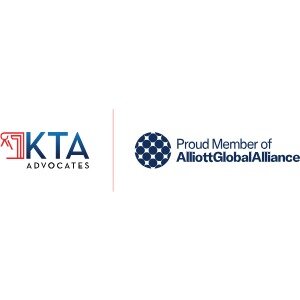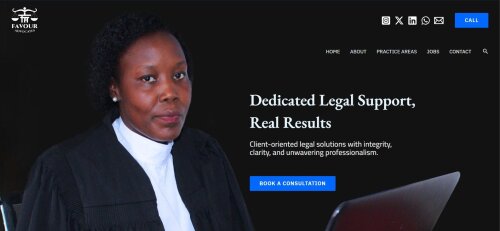Best Wrongful Termination Lawyers in Uganda
Share your needs with us, get contacted by law firms.
Free. Takes 2 min.
Or refine your search by selecting a city:
List of the best lawyers in Uganda
About Wrongful Termination Law in Uganda
Wrongful termination, also known as unlawful or unfair dismissal, occurs when an employer ends an employee's contract in violation of the law. In Uganda, employment relationships are generally governed by the Employment Act, 2006, which provides guidelines on the rights and obligations of both employers and employees. Wrongful termination can occur due to discrimination, retaliation, or failure to follow the legally required dismissal procedure. Understanding your rights and the legal framework in Uganda is crucial if you believe you have been terminated unfairly.
Why You May Need a Lawyer
There are various situations where seeking legal advice may be necessary if you believe you have been wrongfully terminated in Uganda. These include:
- If you suspect your termination was due to discrimination based on race, gender, disability, or other protected characteristics.
- If you were terminated in retaliation for whistleblowing or asserting a legal right, such as filing a worker's compensation claim.
- If your employer did not follow due process, including lack of proper notice or failing to provide valid reasons for termination.
- If you are unsure about the interpretation of your employment contract or applicable laws.
- If you need assistance in negotiating a settlement or navigating the legal process of seeking compensation.
Local Laws Overview
Key aspects of the local laws concerning wrongful termination in Uganda include:
- The Employment Act, 2006: This is the primary legislation governing employment relationships, providing guidelines on contract termination, notice periods, and reasons for fair dismissal.
- Fair Hearing: Employers are required to provide a fair hearing before termination, allowing employees an opportunity to respond to any allegations.
- Notice Requirements: The law stipulates notice periods which must be observed unless termination is due to gross misconduct.
- Grounds for Termination: Termination should be based on a valid reason related to the employee's conduct, capacity, performance, or the operational requirements of the employer.
- Remedies: Employees who are wrongfully terminated may be entitled to remedies such as reinstatement, compensation, or other appropriate relief as determined by the Industrial Court of Uganda.
Frequently Asked Questions
What constitutes wrongful termination in Uganda?
Wrongful termination occurs when the termination of employment contravenes the stipulated processes or is based on discrimination or retaliation, without a valid reason.
What is the first step if I think I have been wrongfully terminated?
Start by reviewing your employment contract and the circumstances surrounding your termination. It may be helpful to gather evidence and consult a lawyer for advice on your specific situation.
How can I prove wrongful termination?
Evidence may include lack of proper notice, documented evidence of discrimination or retaliation, failure to follow procedural requirements, or any correspondence regarding your performance evaluations.
Can I get my job back if I win my case?
Yes, one potential remedy for wrongful termination is reinstatement to your previous position. Alternatively, you may receive financial compensation or other benefits.
What role does the Industrial Court play in wrongful termination cases?
The Industrial Court in Uganda adjudicates disputes related to employment, including wrongful termination claims, and determines the appropriate remedies.
Is there a time limit to file a wrongful termination claim?
Yes, it's imperative to act promptly. Typically, claims should be filed within a reasonable period from the date of termination. Consulting a lawyer can help ensure you meet all deadlines.
Are all employees protected under wrongful termination laws?
Most employees are protected under these laws, but the specifics may vary depending on the employment contract, the terms of employment, and the sector of employment. Consult with a lawyer to understand your protection.
Can I negotiate a settlement before going to court?
Yes, negotiating a settlement is often a viable and less adversarial way to resolve disputes. Legal advice can be beneficial in negotiating terms that are favorable to you.
Is it possible for an employer to terminate without notice?
Employers may terminate without notice in cases of gross misconduct, but these instances must align with what is considered serious offenses under the law.
Who can help me with legal advice on wrongful termination?
Legal professionals specializing in employment law, labor unions, and organizations such as the Uganda Law Society can provide guidance and representation in wrongful termination cases.
Additional Resources
- Uganda Law Society: Offers legal support and resources for those seeking legal advice.
- Ministry of Gender, Labour and Social Development: Can provide information on labor laws and worker rights.
- Federation of Uganda Employers: Offers guidance on both employer and employee rights and responsibilities.
- Industrial Court of Uganda: The court responsible for adjudicating employment disputes including wrongful termination cases.
Next Steps
If you believe you have been wrongfully terminated, consider taking the following steps:
- Gather any relevant documents, such as your employment contract, termination letter, and any correspondence related to your dismissal.
- Consult with a lawyer who specializes in employment law to evaluate your case and understand your legal options.
- Consider whether you would prefer to negotiate a settlement with your former employer or pursue a legal claim.
- File your claim within the stipulated time frame if advised by your legal counsel.
- Prepare to attend mediation or court proceedings with the assistance of your lawyer if necessary.
Lawzana helps you find the best lawyers and law firms in Uganda through a curated and pre-screened list of qualified legal professionals. Our platform offers rankings and detailed profiles of attorneys and law firms, allowing you to compare based on practice areas, including Wrongful Termination, experience, and client feedback.
Each profile includes a description of the firm's areas of practice, client reviews, team members and partners, year of establishment, spoken languages, office locations, contact information, social media presence, and any published articles or resources. Most firms on our platform speak English and are experienced in both local and international legal matters.
Get a quote from top-rated law firms in Uganda — quickly, securely, and without unnecessary hassle.
Disclaimer:
The information provided on this page is for general informational purposes only and does not constitute legal advice. While we strive to ensure the accuracy and relevance of the content, legal information may change over time, and interpretations of the law can vary. You should always consult with a qualified legal professional for advice specific to your situation.
We disclaim all liability for actions taken or not taken based on the content of this page. If you believe any information is incorrect or outdated, please contact us, and we will review and update it where appropriate.
Browse wrongful termination law firms by city in Uganda
Refine your search by selecting a city.

















